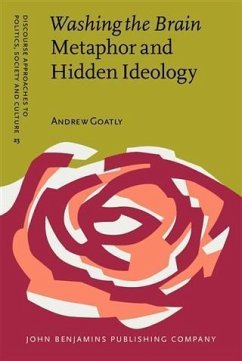Contemporary metaphor theory has recently begun to address the relation between metaphor, culture and ideology. In this wide-ranging book, Andrew Goatly, using lexical data from his database Metalude, investigates how conceptual metaphor themes construct our thinking and social behaviour in fields as diverse as architecture, engineering, education, genetics, ecology, economics, politics, industrial time-management, medicine, immigration, race, and sex. He argues that metaphor themes are created not only through the universal body but also through cultural experience, so that an apparently universal metaphor such as event-structure as realized in English grammar is, in fact, culturally relative, compared with e.g. the construal of 'cause and effect' in the Algonquin language Blackfoot. Moreover, event-structure as a model is both scientifically reactionary and, as the basis for technological mega-projects, has proved environmentally harmful. Furthermore, the ideologies of early capitalism created or exploited a selection of metaphor themes historically traceable through Hobbes, Hume, Smith, Malthus and Darwin. These metaphorical concepts support neo-Darwinian and neo-conservative ideologies apparent at the beginning of the 21st century, ideologies underpinning our social and environmental crises. The conclusion therefore recommends skepticism of metaphor's reductionist tendencies.
Dieser Download kann aus rechtlichen Gründen nur mit Rechnungsadresse in A, B, BG, CY, CZ, D, DK, EW, E, FIN, F, GR, HR, H, IRL, I, LT, L, LR, M, NL, PL, P, R, S, SLO, SK ausgeliefert werden.









